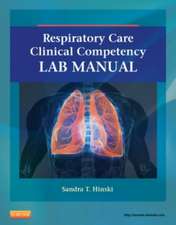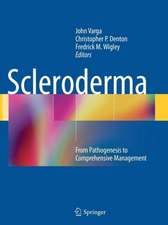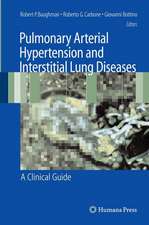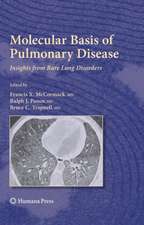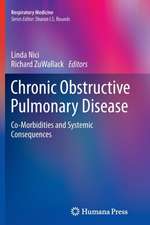Fibrosis Research: Methods and Protocols: Methods in Molecular Medicine, cartea 117
Editat de John Varga, David A. Brenner, Sem H. Phanen Limba Engleză Hardback – 8 aug 2005
| Toate formatele și edițiile | Preț | Express |
|---|---|---|
| Paperback (1) | 783.92 lei 6-8 săpt. | |
| Humana Press Inc. – 10 noi 2010 | 783.92 lei 6-8 săpt. | |
| Hardback (1) | 1108.35 lei 6-8 săpt. | |
| Humana Press Inc. – 8 aug 2005 | 1108.35 lei 6-8 săpt. |
Din seria Methods in Molecular Medicine
- 5%
 Preț: 1278.74 lei
Preț: 1278.74 lei - 15%
 Preț: 655.78 lei
Preț: 655.78 lei - 5%
 Preț: 1106.50 lei
Preț: 1106.50 lei - 5%
 Preț: 727.44 lei
Preț: 727.44 lei - 5%
 Preț: 1108.72 lei
Preț: 1108.72 lei - 15%
 Preț: 650.55 lei
Preț: 650.55 lei - 5%
 Preț: 735.66 lei
Preț: 735.66 lei - 18%
 Preț: 947.35 lei
Preț: 947.35 lei - 18%
 Preț: 948.92 lei
Preț: 948.92 lei - 5%
 Preț: 1114.54 lei
Preț: 1114.54 lei - 5%
 Preț: 1114.91 lei
Preț: 1114.91 lei - 15%
 Preț: 658.55 lei
Preț: 658.55 lei - 5%
 Preț: 734.01 lei
Preț: 734.01 lei - 5%
 Preț: 1111.61 lei
Preț: 1111.61 lei - 5%
 Preț: 1104.32 lei
Preț: 1104.32 lei - 5%
 Preț: 723.21 lei
Preț: 723.21 lei - 5%
 Preț: 1106.13 lei
Preț: 1106.13 lei - 5%
 Preț: 723.05 lei
Preț: 723.05 lei - 5%
 Preț: 723.42 lei
Preț: 723.42 lei - 5%
 Preț: 1115.65 lei
Preț: 1115.65 lei - 5%
 Preț: 786.86 lei
Preț: 786.86 lei - 5%
 Preț: 1133.01 lei
Preț: 1133.01 lei - 5%
 Preț: 1114.71 lei
Preț: 1114.71 lei
Preț: 1108.35 lei
Preț vechi: 1166.69 lei
-5% Nou
Puncte Express: 1663
Preț estimativ în valută:
212.08€ • 221.43$ • 175.52£
212.08€ • 221.43$ • 175.52£
Carte tipărită la comandă
Livrare economică 04-18 aprilie
Preluare comenzi: 021 569.72.76
Specificații
ISBN-13: 9781588294791
ISBN-10: 158829479X
Pagini: 412
Ilustrații: XVI, 392 p. 80 illus.
Dimensiuni: 155 x 235 x 31 mm
Greutate: 0.77 kg
Ediția:2005
Editura: Humana Press Inc.
Colecția Humana
Seria Methods in Molecular Medicine
Locul publicării:Totowa, NJ, United States
ISBN-10: 158829479X
Pagini: 412
Ilustrații: XVI, 392 p. 80 illus.
Dimensiuni: 155 x 235 x 31 mm
Greutate: 0.77 kg
Ediția:2005
Editura: Humana Press Inc.
Colecția Humana
Seria Methods in Molecular Medicine
Locul publicării:Totowa, NJ, United States
Public țintă
ResearchCuprins
The Clinical Scope of Fibrosis.- Pulmonary Fibrosis.- Renal Fibrosis.- Transforming Growth Factor-?.- Regulation of Extracellular Matrix Metabolism: Cultured Cells.- Isolation and Culture of Skin Fibroblasts.- Isolation and Culture of Hepatic Stellate Cells.- Isolation and Phenotypic Characterization of Lung Fibroblasts.- Methods for Measuring Type I Collagen Synthesis In Vitro.- Methods for Assessing the Molecular Mechanisms Controlling Gene Regulation.- Methods for Measuring TGF-? Using Antibodies, Cells, and Mice.- Studying Fibrosis Using Animal Models.- Morphological Methods for Assessment of Fibrosis.- Methods for Measuring Hydroxyproline and Estimating In Vivo Rates of Collagen Synthesis and Degradation.- Approaches to Evaluation of Fibrogenic Pathways in Surgical Lung Biopsy Specimens.- Animal Models for Adult Dermal Wound Healing.- Modeling Liver Fibrosis in Rodents.- Animal Models of Pulmonary Fibrosis.- Animal Models of Renal Fibrosis.- Animal Models of Cardiac Fibrosis.- Genetic Approaches to Studying Fibrosis.- Finding Fibrosis Genes.- Genetic Studies to Identify Hepatic Fibrosis Genes and SNPs in Human Populations.- Analysis of Microarray Experiments for Pulmonary Fibrosis.- DNA Microarrays and Data Mining To Study Hepatic Fibrosis.- Analysis of Proteins Dominantly Expressed in Hepatic Stellate Cells of Activated Phenotype.
Recenzii
"...a must for the shelf of every researcher and physician interested in fibrotic diseases." -Rheumatology
Textul de pe ultima copertă
Fibrosis, or scar tissue, is increasingly recognized as an important feature of many chronic diseases of the lung, kidney, heart, skin, eye, and bone. With some 45% of deaths in the United States attributed to fibrosing disorders and the lack of any effective treatment, research into the cellular, molecular, and genetic basis of fibrosis has exploded. In Fibrosis Research: Methods and Protocols, leading investigators at the forefront of this emerging field review the highlights of current fibrosis work in a variety of disciplines and the experimental methodologies used to uncover the mechanisms that drive it. In their discussion of research techniques utilizing cultured cells to model various aspects of the fibrotic response in vitro, the authors describe the isolation, characterization, and propagation of mesenchymal cells, and highlight the similarities and differences between methods that are appropriate for different types of fibroblasts. Approaches for studying collagen gene regulation and TGF-b production are also discussed, along with experimental methodologies utilizing animal models to study the pathogenesis of fibrosis. Additional techniques presented cover the evolving genetic methods for identifying "fibrosis genes" or allelic polymorphisms in human populations, microarray studies for describing global patterns of gene expression associated with fibrosis, and proteomic approaches to the same. The protocols follow the successful Methods in Molecular Medicine™ series format, each offering step-by-step laboratory instructions, an introduction outlining the principles behind the technique, lists of the necessary equipment and reagents, and tips on troubleshooting and avoiding known pitfalls.
Authoritative and state-of-the-art, Fibrosis Research: Methods and Protocols offers investigators all the powerful experimental methodologies, techniques, and strategies needed today to study and ultimately understand the daunting problem of pathologicalfibrosis.
Authoritative and state-of-the-art, Fibrosis Research: Methods and Protocols offers investigators all the powerful experimental methodologies, techniques, and strategies needed today to study and ultimately understand the daunting problem of pathologicalfibrosis.
Caracteristici
Includes supplementary material: sn.pub/extras


